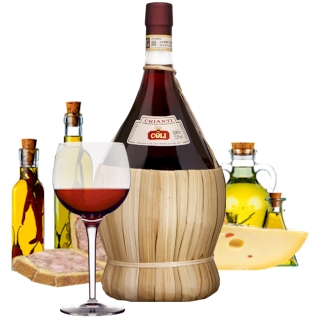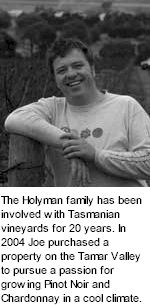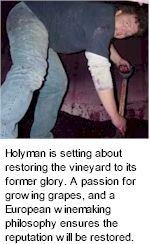


Stoney Rise was started in 2000 with an eye to produce wines that are food friendly, and offer people complex wines without too much oak, or overripe fruit characters. The name comes from a surf break in the Little Dip Conservation Park behind Robe in South Australia. After 10 years in the wine industry, as a sales rep, a wine buyer, and more recently working in wineries it was time for Holyman to make the break and do something on his own. Holyman spent time working in New Zealand, Portugal and France, as well as Tasmania, Mt Benson and Coonawarra, which has given him a broad understanding of wine styles, and how many different people make their wines.

The Holyman family has been involved in vineyards in Tasmania for 20 years. In 2004 Joe purchased a vineyard on the Tamar Valley with the eye to continue a passion for growing Pinot Noir and Chardonnay in this special cool climate. The vineyard, planted to 3 hectares of Pinot Noir and 1 hectare of Chardonnay was established in 1986.
Stoney Rise produced trophy winning wines and high praise in the mid 1990s. Holyman is setting about restoring the vineyard to its former glory. A passion for growing grapes, and a European winemaking philosophy ensures the reputation will be restored.
The Stoney Rise range is all about drinkability. The Pinot Noir goes into the oldest oak we have, for less than twelve months. 50% of the Chardonnay is fermented in new French oak barriques before being bottled early to retain its freshness. Made with fruit from the Mt Benson, the Shiraz is open fermented using wild yeasts and spends its life sleeping in old French oak barriques before bottling.

The Holyman range of wines are wines for cellaring. The Chardonnay and Pinot Noir are both fermented using wild yeast. The Chardonnay spends all of it’s time in new French oak, while 25% of the Pinot Noir goes into new oak for maturation. These wines are made to show passion for the grapes that Stoney Rise grow and will reward with time in the cellar.
In 2007 Holyman had the opportunity to purchase a special parcel of Riesling fruit which he couldn’t refuse. One of the star varietals for Tasmania, Riesling is quickly growing a reputation in Tasmania, for it’s austere, structured fruit characters. The Riesling is made, as with all the Stoney Rise wines in a style that suits early consumption. The nose is floral and citrus fruit driven. The palate is steely with some mineral characters, while being backed by balanced acidity and the slightest hint of approachable residual sugar. Fantastic with Tom Yum soup or chilli prawns this wine is a great drink now, but will reward with some time in the bottle.
Holyman Pinot Noir is the wine Joe loves to make and drink. The Holyman wines are made in a more traditional Burgundian style. They are not reserve wines, but stylistically different and that is why they have a different label. The use of 30% whole bunches in the ferment gives this wine it's structure and finesse. The wine is fermented with wild yeast that is present in the vineyard after a one week period of cold soaking to draw out colour and tannins from the grape skins. The fruit characters are black cherry and plums with hints of mushroom and coffee. The palate is rich and powerful and will slowly develop over the next 5 to 10 years in the bottle.
